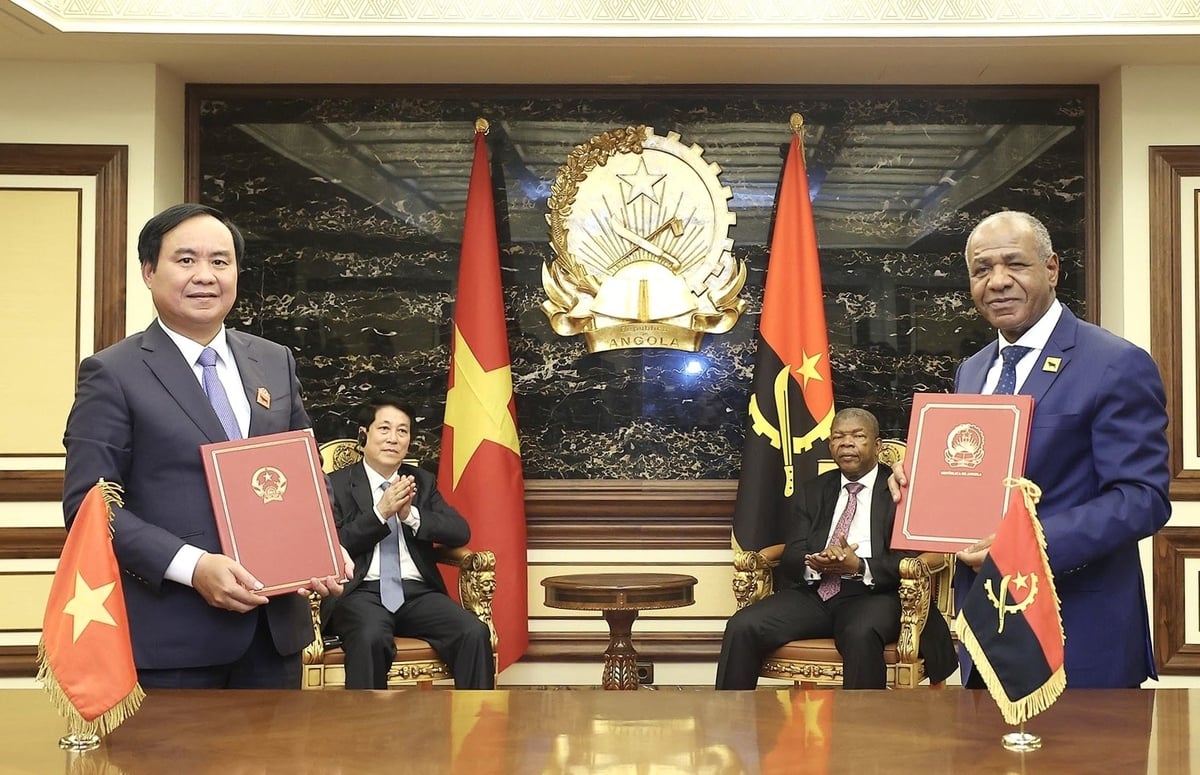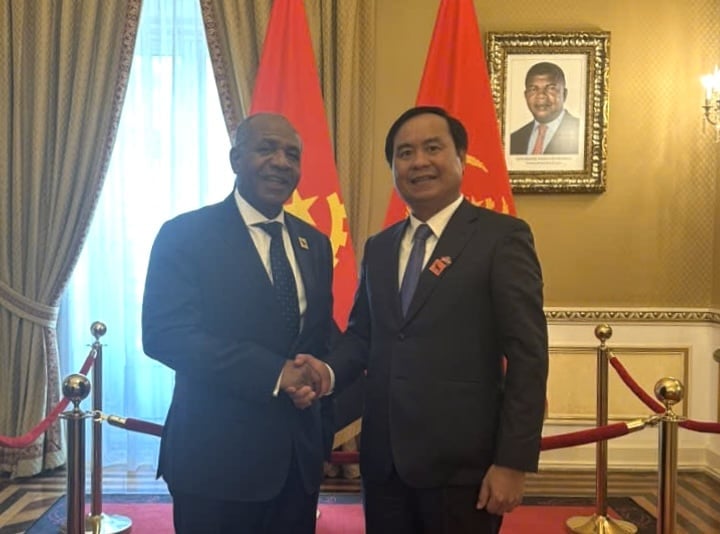November 15, 2025 | 13:20 GMT +7
November 15, 2025 | 13:20 GMT +7
Hotline: 0913.378.918
November 15, 2025 | 13:20 GMT +7
Hotline: 0913.378.918
As part of the official visit to the Republic of Angola, on August 7 in the capital city of Luanda, under the witness of President Luong Cuong and Angolan President João Manuel Gonçalves Lourenço, Vietnam’s Ministry of Agriculture and Environment signed an Action Plan on agricultural cooperation with Angola’s Ministry of Agriculture and Forestry.

Mr. Vo Van Hung, Deputy Minister of Agriculture and Environment of Vietnam (left), and Mr. Isaac Maria dos Anjos, Minister of Agriculture and Forestry of Angola (right), sign the Action Plan on agricultural cooperation under the witness of President Luong Cuong and Angolan President João Manuel Gonçalves Lourenço. Photo: ICD.
Recognizing the pivotal role of agriculture in ensuring food security and driving socio-economic development, Vietnam and Angola reaffirmed their determination to strengthen bilateral cooperation.
This cooperation aims to generate tangible benefits for both countries and achieve the shared strategic objectives of their respective agricultural sectors. Both sides agreed that agricultural collaboration serves as a vital bridge, helping to reinforce the longstanding friendship and foster an ever-closer partnership between the two nations.
In accompanying Angola on its path toward building a sustainable and modern agricultural sector, Vietnam pledged to share its extensive experience, support the adoption and transfer of advanced science and technology, provide training to develop a skilled workforce, and assist in establishing efficient and competitive agricultural value chains.
Furthermore, Vietnam expressed its readiness to create favorable conditions for Vietnamese enterprises to invest in and expand their agricultural operations in Angola, thereby contributing to the sector’s growth and diversification.
Regarding human resource development, Vietnam stated its willingness to welcome Angolan technical experts for study tours and hands-on training in a range of fields, including veterinary medicine, coffee production, rice cultivation, and the standardization and certification of grains. The aim is to enhance Angola’s technical capacity and strengthen its international competitiveness.
Furthermore, the two countries reached a consensus on promoting a range of initiatives aimed at environmental protection and climate change adaptation. These include fostering the development of sustainable forestry, establishing energy plantations, and introducing hydroponic farming systems as well as fruit tree cultivation models that are well-suited to Angola’s ecological and climatic conditions.
In the area of trade, both sides agreed to fully use the network of free trade agreements (FTAs) to which Vietnam is a signatory, with the goal of opening and expanding access for Angolan agricultural products to Eurasian markets. In parallel, they will coordinate in organizing agricultural fairs, exhibitions, and trade forums as platforms to connect enterprises, encourage business partnerships, and foster the growth of bilateral trade.

Angola’s Minister of Agriculture and Forestry and Vietnam’s Deputy Minister of Agriculture and Environment Vo Van Hung pose for a commemorative photo. Photo: ICD.
To ensure timely and effective implementation, the Action Plan sets out a detailed roadmap divided into consecutive two-year phases. Specifically:
During the 2025–2026 phase, the focus will be on building a qualified team of technical experts through intensive training programs while initiating pilot cultivation projects in Angola. These will center on key crops with high economic potential, such as eucalyptus, cassava, and coffee, serving as the foundation for later expansion.
During the 2026–2028 phase, the two sides plan to expand the area under pilot cultivation, establish modern processing and preservation facilities for agricultural produce, and integrate advanced technologies, including Geographic Information Systems (GIS) and the Internet of Things (IoT), into production management.
By the 2028–2030 phase, the proven models will be scaled up and replicated in multiple provinces throughout Angola. This will enable large-scale production, strengthen and complete the agricultural value chains, boost the export of farm products. At the same time, these models will also contribute concretely and sustainably to the socio-economic development of Angola’s rural areas.
For the 2025–2030 period, Vietnam and Angola have defined their overarching strategic objective as promoting sustainable agricultural development and enhancing value creation. Alongside the transfer of crop variety cultivation techniques, biotechnology, and land management practices, the two countries will work together to develop integrated partnership models linking farmers, cooperatives, and enterprises. At the same time, they will advance technologies and build infrastructure for post-harvest preservation to improve product quality, reduce losses, and strengthen competitiveness in both domestic and international markets.
Translated by Phuong Linh

(VAN) According to MAE's Minister, the MoU between the two Ministries will establish a foundation for elevating bilateral cooperation to a new level.

(VAN) The 80-year journey of Quang Ninh’s Agriculture and Environment sector has continuously grown alongside the development of the province and the country.

(VAN) From a country highly vulnerable to climate change, Viet Nam is rising among the leading nations actively responding to its impacts.

(VAN) Viet Nam's cashew industry has seen remarkable growth over the past 35 years, rising to become the world leader in cashew kernel exports, but it is now confronting significant challenges.

(VAN) From maximizing productivity to balancing the ecosystem, Viet Nam’s agriculture is undergoing a strong transformation in the era of emission reduction, affirming the sector’s position after 80 years of development.

(VAN) Every inch of land, every river, every forest, every sea area is not only a space for survival and livelihood development, but also a constituent element of national sovereignty.
/2025/11/13/5446-2-174836_166.jpg)
(VAN) Despite spending more than VND 1 trillion annually on rabies vaccines and antiserum, Viet Nam still records dozens of human deaths each year.